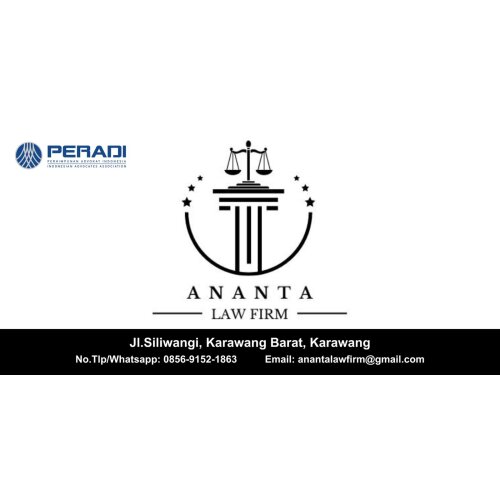Best Toxic Mold Lawyers in Karawang
Share your needs with us, get contacted by law firms.
Free. Takes 2 min.
List of the best lawyers in Karawang, Indonesia
About Toxic Mold Law in Karawang, Indonesia
Toxic mold is a significant health concern, and its presence can lead to various negative health effects, particularly respiratory problems and allergic reactions. In Karawang, Indonesia, there may not be specific legislation that exclusively addresses toxic mold exposure. However, general laws concerning health and safety, property rights, tenant-landlord relationships, and environmental protection could apply to cases involving toxic mold in both residential and commercial properties.
Why You May Need a Lawyer
In situations where you suspect toxic mold is affecting your health or property, a lawyer can help you understand your legal rights and the steps you can take to address the issue. Common situations include tenants discovering mold in their rented homes, homeowners dealing with mold after poor construction, employees being exposed to mold at their workplace, and property owners facing liability allegations due to the presence of toxic mold. These scenarios often require legal expertise to navigate the potential personal injury claims, property damage suits, or tenancy disputes.
Local Laws Overview
While there might not be laws in Karawang, Indonesia specifically targeted at toxic mold exposure, several legal frameworks could have implications for such cases. Relevant regulations may include the Indonesian Building Act, which governs building requirements and could pertain to mold concerns arising from construction defects, and environmental laws that could be invoked if the mold is linked to larger environmental or public health issues. Tenancy laws also provide protections for renters, and they could potentially be used to address mold in rented accommodations.
Frequently Asked Questions
1. What health issues can toxic mold cause?
Toxic mold can lead to respiratory problems, allergic reactions, and in severe cases, mycotoxicosis. Professional medical advice should be sought if exposure has occurred.
2. How is toxic mold detected in a property?
Mold can often be seen or smelled. However, professional assessments are sometimes needed to detect and identify toxic mold spores.
3. Can landlords be held responsible for toxic mold?
If it can be proven that the landlord was aware of the mold and failed to address it, they may be held liable for related health issues or property damage.
4. What damages can be claimed in a toxic mold case?
Claims can include medical costs, lost wages, property devaluation, and sometimes, pain and suffering.
5. How long do I have to file a legal claim for toxic mold exposure?
The statute of limitations for filing a claim may vary, therefore consultation with a lawyer to understand the specific timelines applicable in Indonesia is crucial.
6. Should I have my property tested for mold before selling it?
Property testing can be a proactive step to ensure health and safety, avoid future liability, and maintain property value.
7. What are the responsibilities of a property owner regarding mold?
Owners should maintain properties, prevent moisture build-up, and promptly address mold-related issues.
8. Can employees sue for mold exposure in the workplace?
If negligence can be established on the part of the employer, employees may have grounds to sue for health issues stemming from mold exposure.
9. Are there government agencies that regulate air quality or mold in Indonesia?
The Ministry of Environment and Forestry in Indonesia regulates environmental standards that could potentially include mold issues related to air quality.
10. Can I clean toxic mold by myself?
Toxic mold removal can be dangerous and is best handled by professionals with proper equipment and safety protocols.
Additional Resources
For legal advice on toxic mold, it may be helpful to contact local legal aid organizations or the environmental division of the Indonesian Ministry of Environment and Forestry. Other useful resources include the Indonesian Consumer Protection Foundation and health departments that can provide information on mold-related health risks.
Next Steps
If you need legal assistance in a toxic mold matter, the first step is to document the mold presence and any related damages thoroughly. Then, consult a lawyer with experience in real estate, environmental law, or personal injury, as appropriate. The lawyer will help you understand the local legal context, the merits of your case, and the potential outcomes of legal action.
Lawzana helps you find the best lawyers and law firms in Karawang through a curated and pre-screened list of qualified legal professionals. Our platform offers rankings and detailed profiles of attorneys and law firms, allowing you to compare based on practice areas, including Toxic Mold, experience, and client feedback.
Each profile includes a description of the firm's areas of practice, client reviews, team members and partners, year of establishment, spoken languages, office locations, contact information, social media presence, and any published articles or resources. Most firms on our platform speak English and are experienced in both local and international legal matters.
Get a quote from top-rated law firms in Karawang, Indonesia — quickly, securely, and without unnecessary hassle.
Disclaimer:
The information provided on this page is for general informational purposes only and does not constitute legal advice. While we strive to ensure the accuracy and relevance of the content, legal information may change over time, and interpretations of the law can vary. You should always consult with a qualified legal professional for advice specific to your situation.
We disclaim all liability for actions taken or not taken based on the content of this page. If you believe any information is incorrect or outdated, please contact us, and we will review and update it where appropriate.








